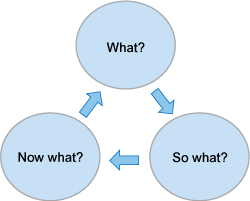2 Applying reflective frameworks for professional development
Models and frameworks, for example, Gibbs’ (1988) model, are frequently applied to facilitate reflective practice. The same key reflective questions that were introduced in Session 2 can be applied to professional practice. At its most basic level, a framework may consist of only three phases (see Figure 1), or it can be based on extended models, for example Gibbs’ (1988) model for reviewing practice and critical incidents (see Table 1). The examples below are only provided as a guide to help you to begin to reflect and learn from events that may have significance to you. The questions act as initial prompts only, to help you to identify and develop options.
| Phase 1 | Description | What happened? What are you going to reflect on? Provide a description of the event. |
| Phase 2 | Feelings | What were you thinking and feeling? What were your reactions and emotional responses at the time? |
| Phase 3 | Evaluation | What was good and bad about the experience? Make value judgements – you can be subjective (your evaluation). |
| Phase 4 | Analysis | What sense can you make of the situation? You can use additional source materials and your work experience here. |
| Phase 5 | Conclusion | What else could you have done? What can you conclude more generally from the experience and from your evaluation and analysis? What can you conclude more specifically about your own personal response, situation or ways of working? |
| Phase 6 | Action Plan | If it arose again, what would you do? What will you do differently in the future, based on this learning event? What is your plan of action now? What steps are you going to take on the basis of what you have learned? |
By applying this systematic method of evaluating, analysing, problem-solving, identifying patterns and creating meaning you will not only reach a higher level of learning, but you will also be able to identify your own learning needs, improve your professional development, and make better professional decisions and judgement calls (meeting the requirements of each situation).

